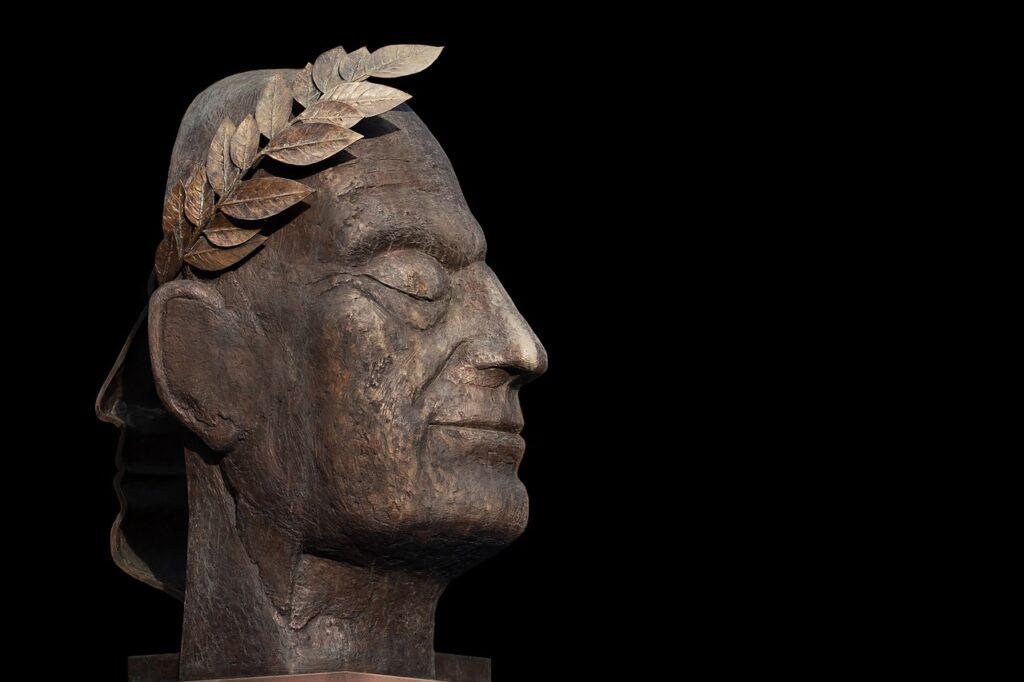The history of ancient Rome is a captivating tale of power, conquest, and cultural influence that continues to shape the modern world. From its legendary founding in 753 BC to the fall of the Western Roman Empire in 476 AD, Rome’s legacy endures through its remarkable leaders, who left an indelible mark on history. The story of Rome’s greatest leaders is a testament to their ambition, military prowess, and political acumen, propelling the empire to unprecedented influence and achievement. As expert Marc Maggisano dives into the lives and legacies of Julius Caesar, Augustus Caesar, and Constantine the Great, we unravel the enduring impact of these iconic figures on ancient Roman history and the world at large.

Rome’s Greatest Leaders: Julius Caesar
Julius Caesar, one of ancient Rome’s most renowned figures, embodied the qualities of a charismatic leader, military genius, and astute politician. Born into a patrician family, Caesar rose to prominence through military exploits and political maneuvering. His conquest of Gaul and the subsequent civil war against Pompey catapulted him to the pinnacle of power in the Roman Republic. As dictator perpetuo, Caesar implemented a series of reforms to strengthen the central government, alleviate social unrest, and expand Rome’s influence. His assassination in 44 BC marked the Roman Republic’s end and the Roman Empire’s beginning under his adopted heir, Gaius Octavius, also known as Augustus.
Marc Maggisano says Caesar’s legacy looms large in the annals of history, as his military conquests and political reforms reshaped Rome’s destiny. His vision of a centralized, autocratic government laid the groundwork for transitioning from the Roman Republic to the Roman Empire. The Julian calendar, which he introduced, became the basis for the modern Gregorian calendar, highlighting the enduring impact of his administrative reforms. Caesar’s assassination, immortalized by William Shakespeare in his eponymous play, “Julius Caesar,” stands as a testament to the enduring fascination with this enigmatic leader and the turbulent times in which he lived.
Rome’s Greatest Leaders: Augustus Caesar
Augustus Caesar, the grandnephew and adopted son of Julius Caesar, emerged as the first Roman Emperor and founder of the Roman Principate. Following the demise of Julius Caesar, Augustus skillfully navigated the treacherous waters of Roman politics, consolidating his power and establishing an enduring legacy as the architect of the Roman Empire. His reign ushered in an era of relative peace and stability known as the Pax Romana, characterized by economic prosperity, cultural flourishing, and monumental architectural projects that transformed the city of Rome. Augustus’ astute propaganda and political acumen solidified his position as the undisputed ruler of the Roman world, earning him the title “Princeps,” meaning “first citizen.”
The legacy of Augustus Caesar reverberates through the annals of history, as his reign brought about a profound transformation in the Roman state and society. His administrative reforms, military campaigns, and patronage of the arts laid the foundation for the golden age of Roman literature, architecture, and philosophy. The iconic Augustan Altar of Peace, an enduring symbol of his reign, is a testament to his vision of Roman unity and prosperity. Augustus’ enduring legacy as the first Roman Emperor and his skillful navigation of the complexities of power continue to inspire intrigue and admiration for this enigmatic figure in ancient Roman history.
Rome’s Greatest Leaders: Constantine The Great
Constantine the Great, the first Roman Emperor to embrace Christianity, left an indelible mark on the history of ancient Rome and the development of the Christian faith. Born in present-day Serbia, Constantine rose to power through a series of military victories and political alliances, culminating in his ascent to the throne as the sole ruler of the Roman Empire. His conversion to Christianity and the Edict of Milan in 313 AD granted religious tolerance to Christians, signaling a pivotal moment in the history of the Roman Empire and the spread of Christianity. Constantine’s establishment of Constantinople as the new capital of the Eastern Roman Empire, known as Byzantium, solidified his legacy as a visionary leader and statesman.
The enduring legacy of Constantine the Great is deeply intertwined with the rise of Christianity and the transformation of the Roman Empire. His patronage of Christian institutions, construction of monumental churches, and convening of the First Council of Nicaea in 325 AD marked a significant shift in the religious landscape of the Roman world. The iconic Arch of Constantine in Rome is a lasting tribute to his victories and the triumph of Christianity under his rule. Constantine’s impact on the history of ancient Rome and the spread of Christianity continues to be a subject of scholarly inquiry and historical fascination, underscoring the enduring legacy of this influential leader.
Conclusion: The Enduring Legacy Of Ancient Rome
The enduring legacy of ancient Rome and its greatest leaders, Julius Caesar, Augustus Caesar, and Constantine the Great, stands as a testament to the enduring impact of their vision, leadership, and enduring contributions to the development of Western civilization. From the heights of military conquest to the flourishing of arts and culture, the enduring legacy of ancient Rome continues to captivate the imagination and inspire scholarly inquiry into the enduring impact of its greatest leaders. As we unravel the enduring legacy of ancient Rome, we gain a deeper appreciation for the enduring influence of its iconic leaders and their contributions to the legacy of Western civilization.